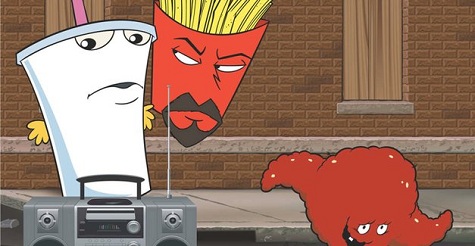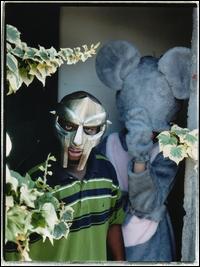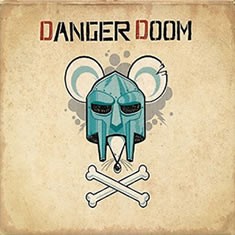(Planet of Sound is a bi-weekly speculative fiction music feature.)
There’s a certain segment of the population—let’s take a stab and guess “geeks and stoners who graduated high school between around 2000 and 2006″—for whom the initialism A.T.H.F., and therefore the subject matter of this chilled-out alternative rap track, will be immediately recognizable, but for the rest of the populace, perhaps I should explain.
A.T.H.F. stands for Aqua Teen Hunger Force, which was the name of an animated show on Cartoon Network/Adult Swim that showcased the adventures of anthropomorphic fast food items Master Shake, Frylock, and Meatwad, along with their neighbor Carl. (The show still airs, but has since been renamed Aqua Unit Patrol Squad 1—and has, to most accounts, diminished drastically in quality.)
The show was sci-fi, I suppose, in that aliens and robots and suchlike made regular appearances (also in that its protagonists were anthropomorphic fast food items), but mostly it was related to the genre in the same way, say, Monty Python and the Holy Grail was—its brand of absurdist, sometimes silly, sometimes surprisingly dark humor garnered a cult following that included many of the same sorts of kids who’d have spent late nights in the basement playing 1st edition D&D in the 70s, and Magic: the Gathering at the turn of the millennium.

Danger Doom, the artists behind the track, could use a little explanation/unpacking, too. The Danger Doom project was a highly lauded collaboration between the masked alternative rap artist MF Doom and the increasingly influential musician/producer Danger Mouse. Danger Mouse has been involved in such mega-successful projects as Gorillaz and Gnarls Barkley; MF Doom never had similar mainstream success, but he’s had a prolific indie career that has included highlights like the universally acclaimed Madvillainy.

(Doom also has an ongoing relationship with sci-fi, comics, and similar geekery, as is probably obvious from his Dr. Doom-inspired metal face.)
Their collaboration produced one full length album, The Mouse and the Mask, and while most of the tracks feature retro cartoon and comic references, along with cameos from Adult Swim characters, “A.T.H.F.” is the only one entirely about a single show. The lyrics are totally clear, and totally straightforward, and just a little not safe for work.
The track also gets an intro from a rapping Meatwad and a skeptical Carl, worth the price of admission all on its own.
This was some of the rap I enjoyed before I started really seeking out rap to listen to, and while the Adult Swim characters may have eased my way in, the real reason it worked was the effortlessly cool vibe projected by Danger’s beats and Doom’s flow which they managed to maintain despite the fact that they were rapping about cartoons (“you know, stuff that, like, I liked”).
I’ve never figured out whether Danger Doom approached Adult Swim first about getting the cartoon cameos (they’re clearly fans), or whether Adult Swim somehow commissioned the work. Either way, I’m glad I got to listen to it—it helped demystify hip-hop a little for me (along with work from other underground rappers like Aesop Rock), and provided a means of entry into a genre that has ended up a source of quite a lot of musical pleasure. It’s not just entry-level music, though; the more I listen to and learn about hip-hop, actually, the more I appreciate The Mouse and the Mask.
If only the shows that inspired the music could have maintained a similarly high level of quality.
Joshua Starr is a fan of speculative fiction in all media. ALL MEDIA.











Yikes you must be a grade A weirdo if you need hip hop to be demystified for you in this day and age.
Tommy made it ok for me to play pinball, before I heard it, it was confusing. you ate my fractal
@1: Let’s clarify–this was six years ago, and while hip-hop was mainstream, sure, it wasn’t quite as completely dominant and cross-pollinating in the culture as it is today. I think there were plenty of geeky kids from the suburbs who didn’t choose to listen to hip-hop, unless it was on at a dance or party or something and they had no choice. I’m sharing a narrative, here.
And let’s also keep in mind that mainstream hip-hop, the sort of stuff you’d encounter if you don’t know where to go actively looking, can still be seriously off-putting, with a lot of casual misogyny and homophobia, and language pretty solidly meant to keep out outsiders–or, at least, to make the people who do listen to it comfortably feel like insiders.
There’s some “bit**es and hos” language on this track, but it’s at least obviously meant as a joke, and immediately undermined. I’ve made a certain amount of peace with hearing that stuff in music I listen to, but it can make it hard to share, and I know plenty of people who choose not to listen to hip-hop for that reason or others.
@2: Tommy didn’t get me to play pinball, but hey, I enjoyed Tommy more because I was already a pinball fan.
So, um, did you like the music?
Pretty sure “Rules” and “Karl Kani” are the same sock-puppet troll. Pay ’em no mind, Josh.
This is a fabulous album. Thanks for spotlighting it. Master Shake’s answering machine messages crack me up every time.
@@.-@: Ha, thanks.
Yeah, I crack up at Shake’s messages, too. On the show, he’s just such a perfect example of extreme unreasonableness, and it’s fun to encounter that personality in a new context.
“Now that I’ve apologized profusely… probably too much.”